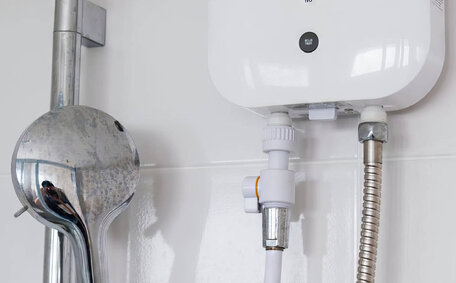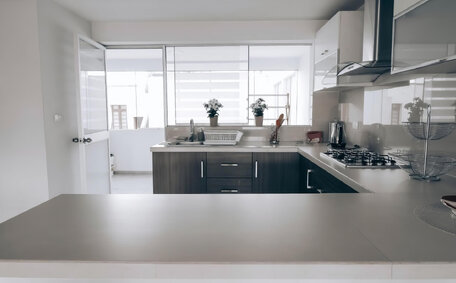Understanding the Dangers of Gas Leaks
Natural gas leaks present severe risks and require immediate attention, making it essential for residential and commercial spaces to regularly inspect their gas systems.
Even small leaks can gradually lead to gas poisoning in your house, as hazardous gases like carbon monoxide build up indoors, compelling you to consider the next steps. Odourless and harmful gases, such as radon gas can penetrate living areas, resulting in symptoms like nausea, dizziness, and in severe cases, unconsciousness or fatality upon inhalation. In situations where you use gas, should you detect a leak indicated by a smell or hissing pipes, evacuate promptly and contact the emergency service.
Recognizing the Signs of a Potential Gas Leak
Remain alert and heed any potential early warnings of gas leaks that may emanate from your stove or other gas-operated gadgets. Given that natural gas can be odourless, suppliers add a distinct rotten egg odour to assist in the early detection of gas leaks. Upon detecting a rotten egg smell, evacuate immediately and call emergency services. Inspect walls and floors for any signs of dead vegetation or unexpected condensation, which could indicate a gas leak displacing oxygen underground.
You may also hear an unusual hissing or whistling sound that could help check gas leak your home as gas escapes appliances or pipework. Look if your gas meter gas flow indicates accelerated activity even without active appliances, or if your bill unexpectedly surges, hinting at potential concealed leaks.
Utilise leak detectors to detect gas leaks in your home, including your BBQ gas units, providing pre-emptive alerts and enhancing your safety measures. These devices are vital so you learn how detect gases that are heavier than air, like natural gas propane, as well as methane and other combustion gases before they become hazardous. Always play it safe by leaving the area and dialling emergency assistance.
Alarms act as supplementary tools that support gas leak detection processes and should be used in conjunction with other safety measures, but they do not replace the need for immediate action if you smell gas or suspect a significant leak.
Odor Detection
There’s no inherent scent in gas, therefore providers infuse a specifically strong “rotten egg” odour to ensure that there’s no mistake when leaks are present. If a faint scent is detected, take immediate action to investigate a potential gas leak near your gas appliances.
Listening for Hissing Noises
The slightest spark risks catastrophic explosions where there is a gas presence. Suspected gas leaks necessitate immediate action as even a short delay can endanger lives. Inform the operator about all locations you heard hissing.
If you ever hear these sounds, refrain from taking any action yourself like switching lights on or attempting to turn off gas valves. Follow emergency procedures by immediately evacuating everyone from the area and calling 000 once outside if gas in your vicinity is suspected to be leaking. It’s critical for safety to confirm the integrity of your natural gas infrastructure and ensure that no risks from gas leaks persist before re-entering the premises. A distinct hissing sound or whistling noises can indicate gas escaping from a gas appliance or pipelines.
Avoid dismissing strange noises around gas as harmless. Teach all household occupants, especially children, to recognise these gas leak sounds. Never downplay the signs gas leaks present, such as extreme flammability and explosive potential when a gas leak occurs. Reacting rapidly and cautiously will help minimise harm to families and homes when leaks arise.
Looking for Physical Signs
Besides odd smells or sounds, actively inspect areas near appliances and assess gas line infrastructure for common leak indicators. Search for bubbles at pipe joints when applying a solution of soapy water, a telltale sign of leaks. This economical leak test mix unveils escaping gas, vital in efforts to prevent gas leaks your vicinity due to evident bubbles. Exercise caution; dying vegetation and visible condensation can suggest gas displacement underground. Explore the exterior of your home as well, seeking dead plants or patches of brown grass. Such vegetation decay flags oxygen loss from gas seepage below. Note any new or growing stain patches on exterior walls or foundations too, which moisture permeating from gas leaks underground cancreate. Inspect the exterior of your house for dead plants or areas of brown grass that can signal a leak, and always enlist professionals for repairs, never trying to fix the issues yourself.
Using Gas Leak Detection Tools
Specialised gas leak detection tools offer convenient at-home monitoring for hidden dangers along your gas line. This ensures continuous monitoring for homes using gas, protecting areas like kitchens and allowing quick leak detection.
Consider using a gas detector, such as audible gas detectors that activate to announce the presence of gas and alert premises when levels heighten. These devices, when activated, utilise advanced sensors to detect leaks including those from mixes of propane and natural gas, while digital displays indicate the precise points of leakage for further assessment.
To guarantee safety and accurately locate gas leaks, consider professional plumbing services with advanced detection methods. The presence of escaping gas forming bubbles under high pressure reveals how even a minor leak can betray itself. Mark these areas so professionals can assess and repair the leaks. This technique easily checks for natural gas leaks in pipework without specialist tools. Always summon a licensed gas fitter to conduct a comprehensive test gas procedure should inspection uncover appliance or pipeline hazards.
You can use a simple mixture by adding a couple drops of dish soap to a water-filled spray bottle for leak detection. Perform soapy water tests by applying this solution onto sectors of exposed gas pipes and joints, observing attentively for bubble formation indicating leaking gas. Nonetheless, recall how to use gas leak indicators like gas detectors and soapy water examinations if you suspect gas leak in your home - never undertake repairs on your own.
Gas Detectors
Gas detectors offer reliable gas leak detection through advanced sensor technology. Place audible detectors near appliances for constant monitoring, staying alert for any indications of gas in the air. Use handheld detectors to systematically look for gas leaks revealing the presence of gas where it shouldn’t be.
Audible natural gas detectors have built-in alarms that activate when hazardous concentrations reach unsafe levels, while portable handheld gas detectors allow active leak checks by sampling air. Both variants possess digital readouts showcasing the amount gas present, such as methane, carbon monoxide, and other flammable gases, quantified in PPM (parts per million).
Look for long battery life (at least one year), UL certification, and detectors finding methane, propane and carbon monoxide for broad leak protection.
Quickly exit if alarms sound and call professionals to investigate causes and repair issues. While alarms need not always signal a grave emergency, never dismiss their warnings as they can prevent worsening gas leaks. Gas detectors provide inexpensive reassurance and let you know how to detect gas leak incidents early when used properly alongside other checks like soapy water tests.
It’s a good idea to always check your gas detectors alongside meter tracking and other leak detection methods and call your local gas provider if anomalies are found, rather than relying solely on technology.
Professional and knowledgeable gas fitters can best investigate causes of such unexplained consumption increases or detector warnings further.
The Soapy Water Test
The soapy water test is an easy, low-cost method which can reveal gas leaks safely and efficiently. Focus on areas most prone to leakage like fittings behind appliances where vibration occurs. Simply mix a couple drops of regular dishwashing detergent into a spray bottle filled with water.
Examine the mixture area meticulously, because where you can see gas bubbles manifest, a gas leak could assuredly be present.
Also avoid spraying electrical components and wipe any excess solution after testing to prevent future corrosion. Certified gas fitters possess specialised training and equipment needed for safe and proper repairs of gas leakage occurrences in your home.
Most importantly, you can only use this technique to identify leaks. Excess suds make it harder to spot tiny gas leak bubbles.
Monitoring Gas Meters
Also check bills monthly and contact providers if usage spikes 20%+ without cause.
Rapid metre movement indicates escaping gas.
If dials spin quickly, this may suggest leaks, which you can verify using the soap water method without using appliances. Unusually high metre readings suggest unseen leaks. Contact gas suppliers who we’re going to investigate and locate hidden leakage across pipes and may instruct you to shut off your supply if necessary. Consider installing a gas leak detector nearby also to monitor for sudden usage spikes indicative of a gas leak in your water system setup. It is crucial not to dismiss unaccounted spikes in your home’s gas usage.
Flee at once if metres accelerate abruptly and reach out for emergency aid as soon possible should significant pipe damage have instigated perilous leak outcomes.
Safety Measures to Take if a Leak is Detected
If you detect a gas leak or suspect one, ensure that all gas sources are safely turned off as your top priority for safety. Quickly act to turn off the gas at the source to reduce risk, provided it is safe. Next, usher everyone out from the premises and turn off all gas supply if a gas leak is suspected, to circumvent any potential ignitions or sparks leading to an explosion. Similarly, refrain from turning electrical devices on or off, including light switches. Call 000 for emergency assistance once safely outside and provide details on the gas smell locations in your home.
Locate your main gas shut-off valve near your gas bottle if you have one, giving the valve a quarter turn until it’s perpendicular to the pipe to halt the flow.
Stress that re-entry is unsafe until emergency crews with specialized gas detection equipment have inspected all appliances and pipelines for leaks. Do not disregard evacuation signals or gas safety warnings; careful actions can ensure your safety, as major leaks leading to indoor gas accumulation carry the risk of toxicity or sudden explosions. Ensure all your family members know about these safety procedures to react appropriately if they ever suspect a dangerous gas leak on your property.
Specialists will employ sophisticated combustible gas detectors to pinpoint leaks, enabling gas leak repair on various gas-fuelled devices. Cooperate fully by answering all questions on the appliances in your home and any recent issues noticed.
When to Call the Professionals
A gas leak can never be disregarded or left unaddressed.
If you suspect a new gas leak in your system or at work, immediately contact licensed gas fitters. The gas smell, unusual sounds, physical signs, detector alarms, or soapy bubble tests all warrant calling certified experts right away before the situation escalates. Do not attempt repairs yourself or search for specific leak locations as this risks sparking explosions.
Gas technicians have extensive training and calibrated equipment to accurately find leakage points across appliances and pipe networks. For leak detection and seal repairs, depend entirely on certified specialists to ensure safety for all.
Make the call immediately if you suspect gas leak and consider annual inspections too as added gas security assurance for households and companies alike.






